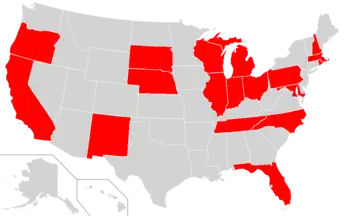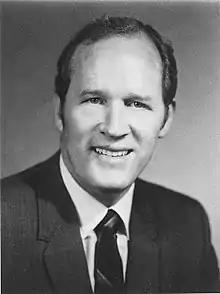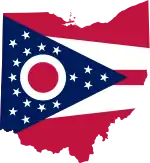| |||||||||||||||||||||||||
| |||||||||||||||||||||||||
 First place finishes by preference primary results | |||||||||||||||||||||||||
| |||||||||||||||||||||||||
From March 7 to June 6, 1972, voters of the Republican Party chose its nominee for president in the 1972 United States presidential election. Incumbent President Richard Nixon was again selected as the nominee through a series of primary elections and caucuses culminating in the 1972 Republican National Convention held from August 21 to August 23, 1972, in Miami, Florida.
Candidates
Nominee
| Candidate | Most recent office | Home state | Campaign
Withdrawal date |
Popular vote | Contests won | Running mate | ||
|---|---|---|---|---|---|---|---|---|
| Richard Nixon |  |
President of the United States (1969–1974) |
 California |
(Campaign) Secured nomination: August 23, 1972 |
5,378,704 (96.9%) |
18 | Spiro Agnew | |
Withdrew during primaries
| Candidate | Most recent office | Home state | Campaign
Withdrawal date |
Popular vote | Contests won | ||
|---|---|---|---|---|---|---|---|
| John M. Ashbrook |  |
U.S. Representative from Ohio (1961–1982) |
 Ohio |
311,543 (5.0%) |
0 | ||
| Pete McCloskey |  |
U.S. Representative from California (1967–1983) |
 California |
 |
132,731 (2.1%) |
0 | |
Polling
National polling
| Poll source | Publication | |||
|---|---|---|---|---|
| Gallup[1] | Feb. 1972 | 5% | 6% | 83% |
Overview of the race
Nixon was a popular incumbent president in 1972, as he seemed to have reached détente with China and the USSR. He shrugged off the first glimmers of that, after the election, because of the massive Watergate scandal.
Polls showed that Nixon had a strong lead. He was challenged by two minor candidates, liberal Pete McCloskey of California and conservative John Ashbrook of Ohio. McCloskey ran as an anti-Vietnam war candidate dedicated to a much more clearer liberal position compared to Nixon's ambiguity approach within the party, while Ashbrook was dedicated to a much more clearer conservative position than Nixon and opposed Nixon's détente policies towards China and the Soviet Union. In the New Hampshire primary McCloskey's platform of peace garnered 19.7% of the vote to Nixon's 67.9%, with Ashbrook receiving 10.9% and comedian Pat Paulsen receiving 1.1%.[2] Having previously stated that he would withdraw from the race had he not achieved 20% of the vote, McCloskey did so.
Nixon won 1,347 of the 1,348 delegates to the GOP convention, with McCloskey receiving the vote of one delegate from New Mexico.[3]
Timeline of the race
March 7
| Candidate | Votes | % | |
|---|---|---|---|
| Richard M. Nixon (incumbent) | 79,239 | 67.6 | |
| Paul N. McCloskey | 23,190 | 19.8 | |
| John M. Ashbrook | 11,362 | 9.7 | |
| Others | 3,417 | 2.9 | |
| Total votes | 117,208 | 100.0 | |
March 14
| Candidate | Votes | % | |
|---|---|---|---|
| Richard M. Nixon (incumbent) | 360,278 | 87 | |
| John M. Ashbrook | 36,617 | 8.8 | |
| Paul N. McCloskey | 17,312 | 4.2 | |
| Total votes | 414,207 | 100 | |
March 21
| Candidate | Votes | % | |
|---|---|---|---|
| Richard M. Nixon (incumbent) | 32,550 | 97 | |
| John M. Ashbrook | 170 | 0.5 | |
| Paul N. McCloskey | 47 | 0.1 | |
| Others | 802 | 2.4 | |
| Total votes | 33,569 | 100 | |
April 4
| Candidate | Votes | % | |
|---|---|---|---|
| Richard M. Nixon (incumbent) | 277,601 | 96.9 | |
| Paul N. McCloskey | 3,651 | 1.3 | |
| John M. Ashbrook | 2,604 | 0.9 | |
| "None of the names shown" | 2,315 | 0.8 | |
| Others | 273 | 0.1 | |
| Total votes | 286,444 | 100 | |
April 25
| Candidate | Votes | % | |
|---|---|---|---|
| Richard M. Nixon (incumbent) | 99,150 | 81.2 | |
| Paul N. McCloskey | 16,435 | 13.5 | |
| John M. Ashbrook | 4,864 | 4 | |
| Others | 1,690 | 1.4 | |
| Total votes | 122,139 | 100 | |
| Candidate | Votes | % | |
|---|---|---|---|
| Richard M. Nixon (incumbent) | 153,886 | 83.3 | |
| George C. Wallace | 20,472 | 11.1 | |
| Others | 10,443 | 5.7 | |
| Total votes | 184,801 | 100 | |
May 2
| Candidate | Votes | % | |
|---|---|---|---|
| Richard M. Nixon (incumbent) | 417,069 | 100 | |
| Total votes | 417,069 | 100 | |
| Candidate | Votes | % | |
|---|---|---|---|
| Richard M. Nixon (incumbent) | 692,828 | 100 | |
| Total votes | 692,828 | 100 | |
May 4
| Candidate | Votes | % | |
|---|---|---|---|
| Richard M. Nixon (incumbent) | 109,696 | 95.8 | |
| John M. Ashbrook | 2,419 | 2.1 | |
| Paul N. McCloskey | 2,370 | 2.1 | |
| Others | 4 | 0 | |
| Total votes | 114,489 | 100 | |
May 6
| Candidate | Votes | % | |
|---|---|---|---|
| Richard M. Nixon (incumbent) | 159,167 | 94.8 | |
| Paul N. McCloskey | 8,732 | 5.2 | |
| Total votes | 167,899 | 100 | |
May 9
| Candidate | Votes | % | |
|---|---|---|---|
| Richard M. Nixon (incumbent) | 179,464 | 92.4 | |
| Paul N. McCloskey | 9,011 | 4.6 | |
| John M. Ashbrook | 4,996 | 2.6 | |
| Others | 801 | 0.4 | |
| Total votes | 194,272 | 100 | |
| Candidate | Votes | % | |
|---|---|---|---|
| Unpledged delegates at large | 95,813 | 100 | |
| Total votes | 95,813 | 100 | |
May 16
| Candidate | Votes | % | |
|---|---|---|---|
| Richard M. Nixon (incumbent) | 99,308 | 86.2 | |
| Paul N. McCloskey | 9,223 | 8 | |
| John M. Ashbrook | 6,718 | 5.8 | |
| Total votes | 115,249 | 100 | |
| Candidate | Votes | % | |
|---|---|---|---|
| Richard M. Nixon (incumbent) | 321,652 | 95.5 | |
| Paul N. McCloskey | 9,691 | 2.9 | |
| Unpledged delegates | 5,370 | 1.6 | |
| Others | 30 | 0 | |
| Total votes | 336,743 | 100 | |
May 23
| Candidate | Votes | % | |
|---|---|---|---|
| Richard M. Nixon (incumbent) | 231,151 | 82 | |
| Paul N. McCloskey | 29,365 | 10.4 | |
| John M. Ashbrook | 16,696 | 5.9 | |
| Others | 4,798 | 1.7 | |
| Total votes | 282,010 | 100 | |
| Candidate | Votes | % | |
|---|---|---|---|
| Richard M. Nixon (incumbent) | 4,953 | 88.3 | |
| Paul N. McCloskey | 337 | 6 | |
| John M. Ashbrook | 175 | 3.1 | |
| Unpledged delegates at large | 146 | 2.6 | |
| Total votes | 5,611 | 100 | |
June 6
| Candidate | Votes | % | |
|---|---|---|---|
| Richard M. Nixon (incumbent) | 2,058,825 | 90.1 | |
| John M. Ashbrook | 224,922 | 9.8 | |
| Others | 175 | 0 | |
| Total votes | 2,283,922 | 100 | |
| Candidate | Votes | % | |
|---|---|---|---|
| Unpledged delegates at large | 215,719 | 100 | |
| Total votes | 215,719 | 100 | |
| Candidate | Votes | % | |
|---|---|---|---|
| Richard M. Nixon (incumbent) | 49,067 | 88.5 | |
| Paul N. McCloskey | 3,367 | 5.5 | |
| "None of the names shown" | 3,035 | 5.5 | |
| Total votes | 104,536 | 100 | |
| Candidate | Votes | % | |
|---|---|---|---|
| Richard M. Nixon (incumbent) | 52,820 | 100 | |
| Total votes | 52,820 | 100 | |
Results by popular vote
| Candidate | Votes | % | |
|---|---|---|---|
| Richard M. Nixon (incumbent) | 5,378,704 | 86.9 | |
| Unpledged delegates | 317,048 | 5.1 | |
| John M. Ashbrook | 311,543 | 5.0 | |
| Paul N. McCloskey | 132,731 | 2.1 | |
| George C. Wallace | 20,472 | 0.3 | |
| "None of the names shown" | 5,350 | 0.1 | |
| Others | 22,433 | 0.4 | |
| Total votes | 6,188,281 | 100 | |
See also
References
- ↑ "US President - R Primaries". OurCampaigns.com. 16 Nov 2004. Retrieved 29 Oct 2020.
- ↑ "New Hampshire Finals". The Miami Herald. UPI. March 15, 1972. Retrieved June 23, 2021.
- ↑ "Nixon Renominated". Partners.nytimes.com. 1972-08-23. Retrieved 2016-05-05.
- 1 2 3 4 5 6 7 8 9 10 11 12 13 14 15 16 17 18 19 20 21 Kalb, Deborah, ed. (2010). Guide to U.S. Elections (6th ed.). Washington, DC: CQ Press. pp. 412–415. ISBN 9781604265361.
.jpg.webp)
